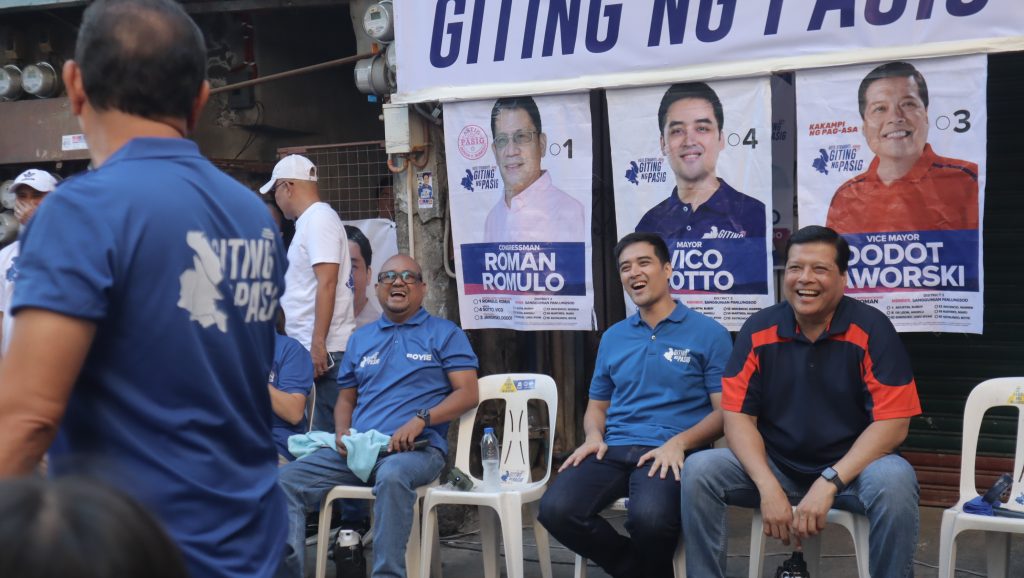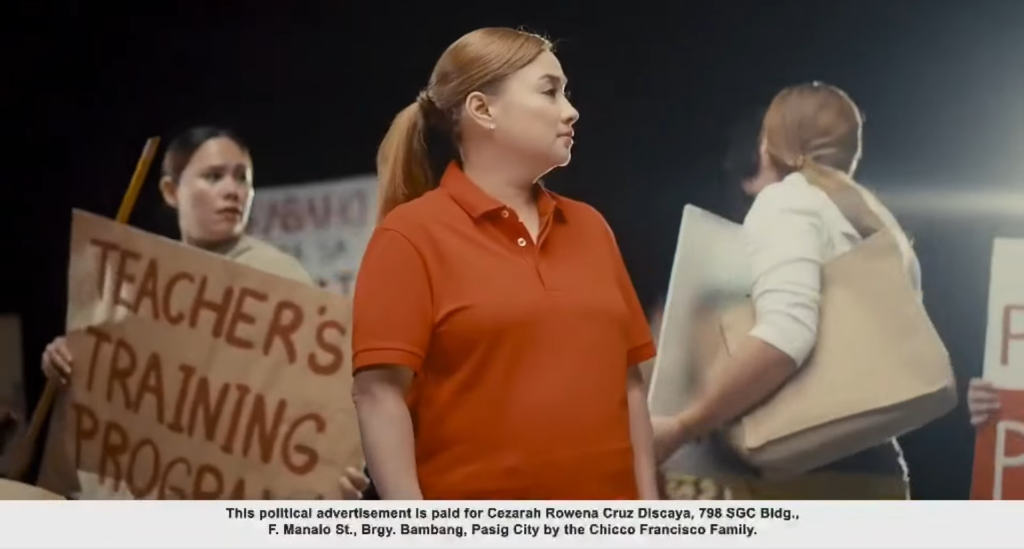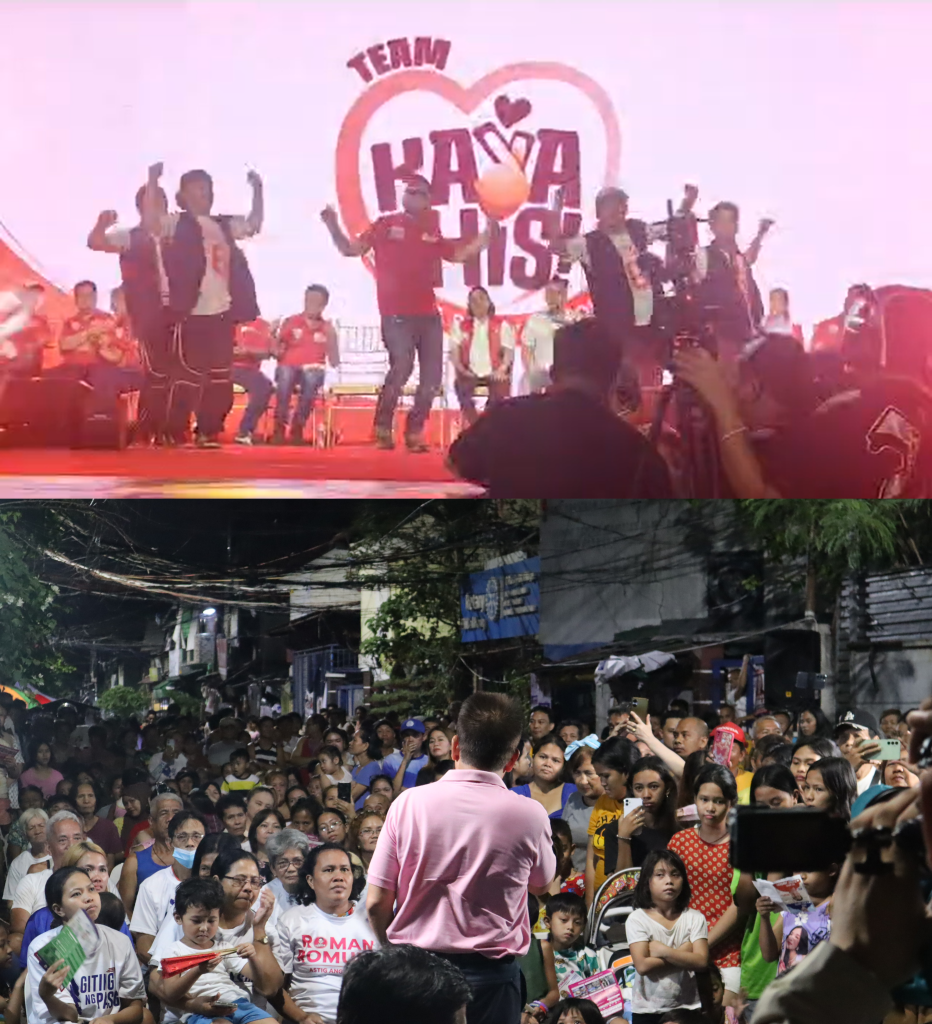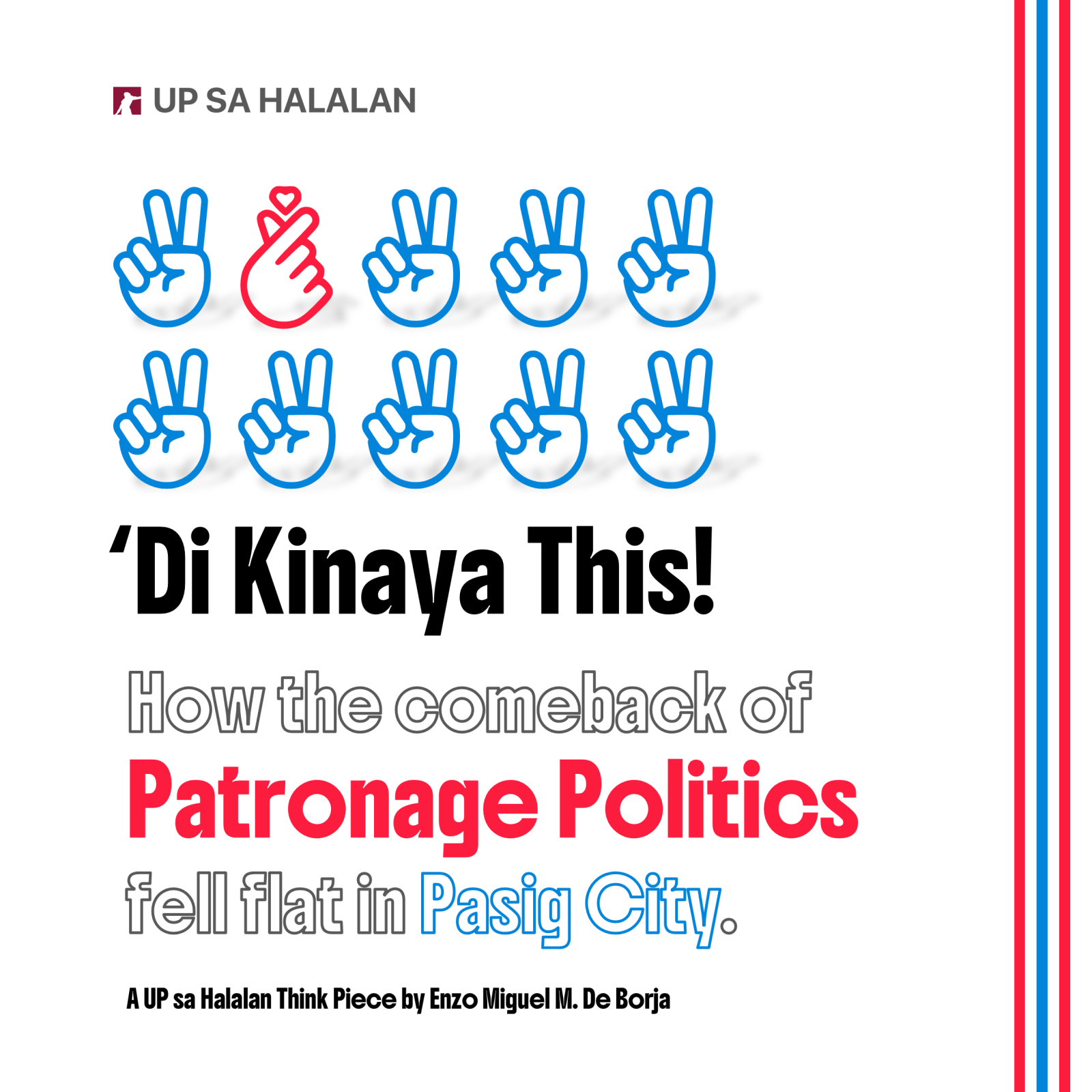In Philippine politics, it remains true that money talks. But in this election, at least, the voices of Pasigueños proved more powerful.

“The Mayor focused on Good Governance.”
When the people of Pasig City needed reminding why they granted Vico Sotto two consecutive terms as Mayor, it was Sara Discaya herself who provided the reminder. The interview that prompted Discaya to offer an assessment of Sotto’s administration was pivotal in defining the trajectory of a hotly-contested election between two starkly different campaigns. One campaign promised an infrastructure spree while practicing the old ways of patronage politics. The other was a progressive campaign that looked to the future.
Months later on election day, Pasigueños made loud and clear that they were not going back.
There are many reasons why the attempted comeback of patronage politics in Pasig City fell flat in the 2025 local elections. Looking into how the two campaigns approached the contest and appealed to voters can shed light on a number of those reasons.
The Discaya Campaign: Promises galore
Cezarah Rowena “Sarah” Discaya is the owner of St. Gerrard General Contractor and Development Corporation, a contracting company based in Pasig City. In a previous interview with ABS-CBN News, Discaya’s husband expressed that it was Sotto who “provoked” her to run for the city’s top post.
Long before the formal campaign period began, Discaya and her camp were already making the rounds in Pasig City. While Sotto opted to forego any form of premature campaigning, Discaya’s seemingly bottomless well of resources allowed her to hold medical missions, mobile kitchens, cash and aid distributions, and all sorts of other events in an attempt to introduce herself to voters. Discaya’s strategies and tactics were still considered the norm in Pasig City just six years ago before Sotto defeated the once mighty Eusebio political dynasty in the fateful 2019 mayoral race.
Discaya’s poorly articulated statement on Sotto’s focus on good governance and choice of means to reach voters made clear that she wanted to bring back the patronage politics of old in Pasig City. In a series of campaign advertisements, interviews, and other public releases on social media, Discaya aimed to exploit grievances that Pasigueños may have had with Sotto’s administration. These include alleged difficulties in accessing medical services at Pasig City General Hospital, the slow disbursement of financial, medical, and burial assistance through the Social Welfare Assistance Center, and the paucity of big ticket infrastructure projects that Pasigueños were once accustomed to.

Aside from emphasizing the administration’s perceived shortcomings, Discaya also invested heavily in her media presence and online communications. Talk shows with national reach hosted by well-known broadcasters began featuring Discaya and her life story — something uncommon for candidates in local races. An army of vloggers and online warriors covered and defended her campaign’s every move on social media. Meanwhile, Discaya’s camp did not shy away from filing a flurry of legal cases against Sotto and publicizing their contents to influence voters.
Discaya promised and she promised a lot. Her team’s assessment of the electorate’s mood on Sotto’s brand of leadership fueled glittering pledges to construct new hospitals, schools, parking buildings, cell sites, expansive healthcare databases, and other components of a “smart” (i.e., digitalized) city that were illustrated via 3D sketches in many of her campaign posters and billboards.

Moreover, Discaya was able to form a formidable slate that included former and current Barangay officials, previously term-limited Councilors, Miss Universe 2011 third runner up Shamcey Supsup-Lee, and celebrity Ara Mina Almarinez. They called themselves Team “Kaya This,” a play on the reverse of the syllables of the name Discaya that translates to “We can do this.” Team Kaya This wasted no time inundating the streets of Pasig with their professionally-designed posters, projecting strength as their opponents decided to hold back.
The extent and depth of Discaya’s machinery and resource pool, the quality of the candidates that composed her slate, and the intensity of her mainstream and online media presence made even seasoned local operatives allied with Sotto uneasy. How could they possibly overcome a deluge of ayuda and disinformation with a strategy hinged on eschewing the dirty tricks of old?
As it turned out, they had little to worry about.
The Sotto Campaign: Principled and People-powered
“Bakit mo ba gustong tumakbo?”
This was the question Pasig City Mayor Vico Sotto said he asked aspirants to his “Giting ng Pasig” slate before the election season began. While campaigning, Sotto would often tell voters how rigorous the vetting process had to be, and for good reason.
In the past six years, Sotto had upended Pasig City politics in many ways. His administration cleaned up corruption in the city’s bidding and procurement procedures, allowing the city to increase its savings. In turn, it made information about the city and barangay budgets available to the public and eliminated a “palakasan” system where only a select few could access certain benefits from the City Government. Sotto also endeavored to improve and expand the city’s existing programs for students, solo parents, and senior citizens, and encouraged the participation of Non-Governmental Organizations (NGOs) in local governance as partners and watchdogs.

As he campaigned to secure a third and final term as Mayor, Sotto pleaded with voters to give his slate a clean sweep. He emphasized that only with a government united in principle could the victories of his first two terms be secured and his program of good and accountable governance accelerate and reach greater heights in the next three years.
At every turn, Sotto’s camp stubbornly refused to keep up with the game Discaya was playing. There were no cash and aid distributions, mobile kitchens, medical missions, and other shenanigans that would often characterize patronage-based local electoral campaigns. During the 45-day formal campaign period, posters bearing Sotto’s name and face were rare finds, and the Mayor did not bother playing his own campaign jingle in house-to-house operations. Instead, it was the people themselves who took up the slack. Individual households would create personalized posters with quirky taglines for Sotto that eventually went viral. When Discaya’s camp would hurl unfounded accusations at Sotto’s administration online, Sotto’s team was quick to show their receipts.
The differences between Discaya’s Team Kaya This and Sotto’s Giting ng Pasig were also apparent in their campaign sorties. Discaya preferred setting up an elaborate stage with lighting, sounds, LED screens, video presentations, and programs that would last for several hours. However, Team Kaya This’ candidates were light on platforms but heavy on dance moves — qualities reminiscent of Eusebio-era campaign events. On the other hand, Sotto kept things simple. In Giting ng Pasig sorties, there was no stage; the candidates were at eye-level with voters. The sorties’ focus was not on fiesta-like performances but on the slate members’ past achievements and future plans for the city.

Perhaps the most striking difference between Discaya and Sotto is how the latter actively campaigned on not making any promises: “Kung maganda at magaling, hindi na po natin ipapangako. Gagawin na lang natin.”
Providing a stark contrast to the ways of patronage politics helped the Giting ng Pasig candidates differentiate themselves from the rest of the field. Numerous controversies and gaffes also damaged the cause of Team Kaya This. These include Discaya’s failure to attend COMELEC’s covenant signing for fair and peaceful elections, disqualified candidate Ian Sia’s remarks on solo parents, and Discaya’s admission of being a first-time voter in the 2025 local elections, among others. Further buoyed by Mayor Vico Sotto’s enthusiastic endorsements, Giting ng Pasig achieved a 15-0 sweep and dislodged Team Kaya This City Council candidates from the winning circle even in their home barangays.
What happens next?
In Philippine politics, it remains true that money talks. But in this election, at least, the voices of Pasigueños proved more powerful. Mayor Vico Sotto and his allies must now show the people of Pasig City and the entire country that good governance does not rest on its laurels; it gets to work. Sotto must address any lapses his administration may have had in the past six years, further improve policies, programs, and initiatives that have been successful, and chart new paths for progressive champions elsewhere to follow.
Nothing has to stay the way it is, and this is especially the case in the messy world of electoral politics. The forces of patronage in the city may once again become more successful in courting public support. However, some things are indeed capable of enduring. Only time will tell if Sotto’s quest to eliminate corruption and deliver for his constituents will fundamentally alter Pasig City’s politics, outlast his term in office, and extend its reach to the rest of the Philippines.
Enzo Miguel M. De Borja served as Assistant Campaign Manager for Councilor-elect Ronald Mejia Raymundo, a member of the Giting ng Pasig slate, in the 2025 Pasig City local elections.
He is also the Research Assistant of the UP sa Halalan project. However, the views expressed are solely of the author and do not reflect the views of UP sa Halalan and UPD Department of Political Science.
